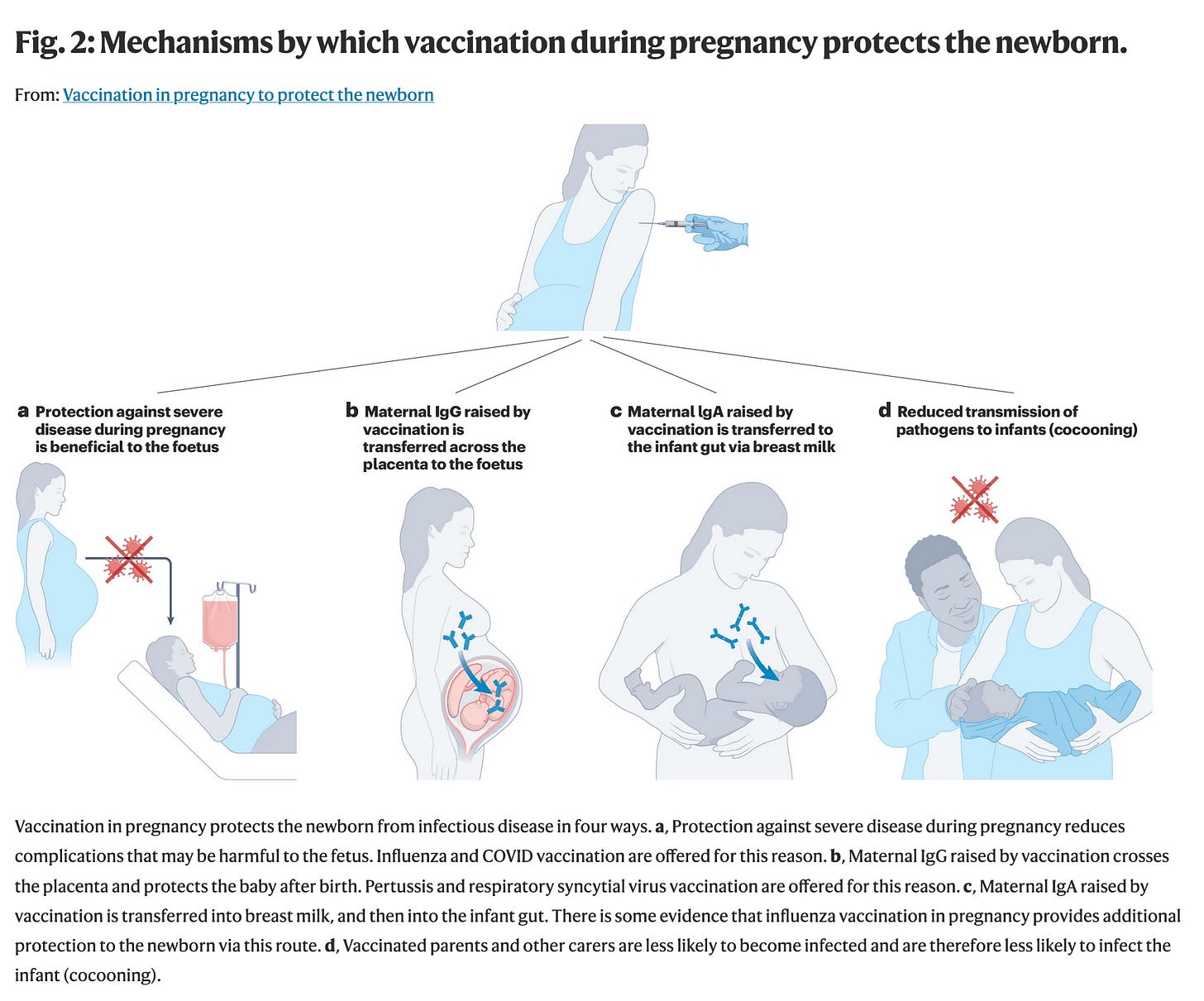TL;DR: Maternal antibodies cross the placenta and protect babies from infections in their most vulnerable early months. If you (or a loved one) are pregnant, make sure to get the recommended vaccines in your second or third trimester.
Happy (US) Mother’s Day! In honor of our “birth givers” (the name my daughter exclusively called me for a good two years as a tween), I’m celebrating the wondrous ability of maternal antibodies to protect newborns even after birth. It’s like your Mom sent you an immune care package across the placenta packed with exactly what you need to survive your first semester of life.
(Also, a heartfelt shout-out to all the mothers who didn’t physically birth their children…you’ve also been essential to building your kid’s immunity for their whole lives!)
I’m summarizing here a great new review paper in Nature Reviews Immunology by Dr. Viki Male and Dr. Christine Jones about how vaccination during pregnancy protects newborns. Please check it out if you want to Nerd out on all the details.
Newborns: Cute, but Immunologically Clueless
Newborn babies are especially vulnerable to severe disease and death from infectious diseases because their immune system is still “naïve” and hasn’t yet been educated by encounters with any of the worlds bugs (whether good, bad, or neutral).
“Transplacental transfer” of antibodies to the rescue
Fortunately, maternal antibodies can cross the placenta and are passed through breastmilk, providing critical early protection. Moving antibodies from maternal to fetal blood circulation is no small feat, as they must pass through multiple cell layers and checkpoints along the way from mother-to-placenta-to-fetus (see this summary figure for the detailed biology).
But this remarkable antibody transfer means that mothers can pass along protection to infections they’ve had AND that vaccination during pregnancy provides a great opportunity to give newborns high levels of protection when they need it most.
Source: Male, V., Jones, C.E. Vaccination in pregnancy to protect the newborn. Nat Rev Immunol (2025).
Vaccine timing matters
There’s minimal placental antibody transfer in the first trimester, but it ramps up in the second and peaks in the third. That means the sweet spot for pregnancy vaccination is between 26 and 34 weeks, which maximizes levels of antibodies in babies born at full term. This timing gives time for the mother’s immune system to respond and for antibodies to make the trans-placental trek.
Vaccination after 34 weeks can be too late — not enough time for the maternal immune response and antibody handoff, especially if babies arrive early. On average antibody levels in the baby’s blood are highest in the first month and gradually wane to low levels by 3-4 months after birth.
Which Vaccines are Recommended During Pregnancy?
In most high-income countries, the recommended pregnancy vaccines are:
Pertussis (whooping cough): Pertussis is a highly contagious respiratory virus that is nasty for everyone (think of coughing fits that last for months and are so severe you can break a rib), but is especially dangerous for babies. Sadly, whooping cough cases are on the rise, so it’s more important than ever that you get a vaccine in the last trimester of each pregnancy. (All adults should get a Tdap booster every ten years, and especially make sure you are up to date if you will be around a newborn baby).
Influenza and COVID-19: Both flu and COVID are more dangerous to pregnant mothers and infants. Both vaccines are safe during pregnancy, with evidence that they reduce the risk of preterm and stillbirths. (For example, check out this cool study by my friends Drs. Jenna Nobles and Florencia Torche on COVID-19 and infant health). The seasonal influenza vaccine is typically given in the fall/winter regardless of where you are in your pregnancy. Since COVID-19 circulates year-round, it’s best to time the vaccine in the last trimester around the time of the pertussis shot to maximize protection for your infant’s early months.
RSV: Respiratory syncytial virus (RSV) is another leading cause of acute lower respiratory tract infection in children. RSV is the leading cause of infant hospitalizations in the US and causes more than 2 million doctor’s visits in kids under age 5 annually. In the past two years, RSV vaccination during pregnancy and infant immunization with anti-RSV monoclonal antibody have become available, both huge breakthroughs in reducing the burden of this infection. The two RSV options are:
Maternal vaccination (brand name Abryvso) between 32-36 weeks’ gestation—maternal antibodies to RSV are then passed to the baby and protect them for up to 6 months during their first (and most dangerous) RSV season.
RSV antibody for the baby- Nirsevimab (brand name Beyfortus in the US) is recommended for all babies <8 months whose mothers did not receive the RSV vaccine during pregnancy. Beyfortus is a monoclonal antibody rather than a vaccine, but it has the same effect of providing protection against infection. The dose should be given to babies shortly before the RSV season, or within 1 week after birth if born between October and March. Spain introduced universal immunization of all newborns with Nirsevimab in 2023-24 and saw dramatic reductions in infant hospitalizations.
Source: Male, V., Jones, C.E. Vaccination in pregnancy to protect the newborn. Nat Rev Immunol (2025).
What about measles?
With the concerning rise in measles cases, you might be wondering if you can boost your newborn’s protection. Unfortunately the measles vaccine is not given during pregnancy because it’s made of a live, weakened virus (which could theoretically cross the placenta). Given the current measles outbreaks, getting a measles booster ahead a planned a pregnancy might give you peace of mind that you are transferring high levels of protection to your little one.
BOTTOM LINE:
Moms give their babies an amazing gift of immunity while still in the womb. Vaccination during pregnancy can maximize this protection for newborns and prevent lots unnecessary suffering during their first months of life.
Happy Mother’s Day everyone!
(At my PhD graduation…they are a tad bigger now).
Stay well,
Jenn







Excellent review, and I totally agree of course! I have not practiced OB since residency, but I do try to encourage my pregnant patients in primary care to get all recommended vaccines as you've outlined. Pretty magical protection flowing across the placenta.
Great article. Happy Mother's Day to you, Jenn!